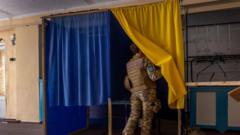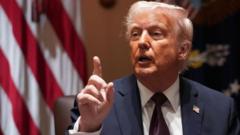On March 29, 2025, interim President Ahmed al-Shara unveiled a new caretaker government aimed at steering Syria through its complex transition after decades of dictatorship. The cabinet's composition, particularly the selection of key ministry leaders, reflects al-Shara's commitment to create a government that embodies the diverse voices of Syrian society.
Syria's New Government: A Test of Inclusivity After Dictatorship

Syria's New Government: A Test of Inclusivity After Dictatorship
Amidst a changing political landscape, Syria's interim president appoints new ministers, signaling a pivotal moment in the country's path to democracy.
Al-Shara, who had previously spearheaded rebel efforts against Bashar al-Assad's regime, took the opportunity at the presidential palace in Damascus to pledge that the new administration would work toward holding elections in a timeline that could extend up to four years due to the ongoing turmoil.
His government features seasoned officials and includes the appointment of the first female minister, but critics are already closely scrutinizing the prominent roles given to his allies in critical departments like defense and foreign affairs. The implications of these choices will likely determine the success of his promise to foster an inclusive governance structure representing Syria's disparate religious and ethnic groups, hence serving as a litmus test for his presidency's legitimacy.
With this transitional government in place, al-Shara's administration not only marks an end to the Assad-linked authority but also raises questions about the efficacy of power-sharing and collaboration across Syria's varied factions moving forward. The international community's response and the domestic public's reception of this new leadership will be crucial in evaluating its potential for lasting change.
His government features seasoned officials and includes the appointment of the first female minister, but critics are already closely scrutinizing the prominent roles given to his allies in critical departments like defense and foreign affairs. The implications of these choices will likely determine the success of his promise to foster an inclusive governance structure representing Syria's disparate religious and ethnic groups, hence serving as a litmus test for his presidency's legitimacy.
With this transitional government in place, al-Shara's administration not only marks an end to the Assad-linked authority but also raises questions about the efficacy of power-sharing and collaboration across Syria's varied factions moving forward. The international community's response and the domestic public's reception of this new leadership will be crucial in evaluating its potential for lasting change.




















